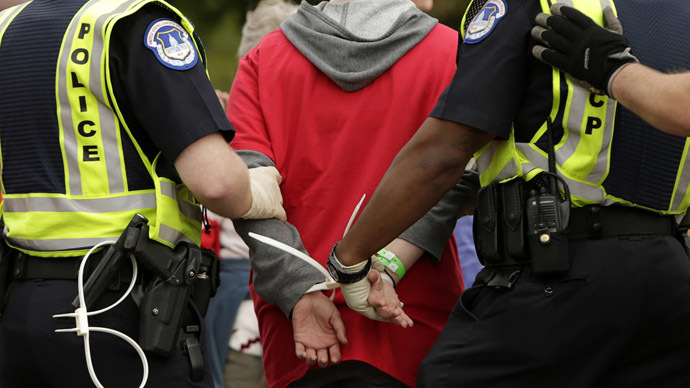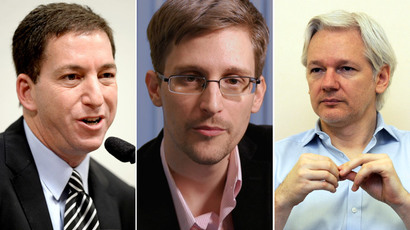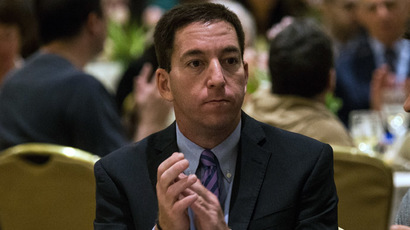Warrantless cellphone searches get hearing in Supreme Court

The Supreme Court will hear two cases – one involving a suspected drug dealer, the other a gang member – to determine the legality of police searching cellphones without a warrant at the time of an arrest.
The landmark cases pit the Obama administration, still reeling
from whistleblower Edward Snowden’s NSA revelations, against
civil rights advocates who say police are conducting illegal
search and seizures.
In the digital age, when about 90 percent of US citizens own
cellphones and 58 percent have a smart phone, a legal battle is
raging behind the scenes as to whether cellphones should be
protected under the Fourth Amendment, which forbids
“unreasonable searches and seizures.” Or should the
technology become fair game for the police following an arrest?
The question will be considered in the case of David Leon Riley
(Riley v California 13-1312), who was pulled over in San
Diego in 2009 for driving with an expired license. After
discovering guns in his car, the police found evidence on Riley’s
Samsung smart phone that got him convicted on attempted murder
charges.
The state of California rejected efforts by Riley’s attorney to
toss out the use of the digital evidence.
In the other case (United States v Wurie, 13-212), Brima
Wurie was arrested in Massachusetts for dealing drugs. Following
a search of his cellphone’s call log, investigators found an
address, where they discovered more illegal substances and a gun.
Unlike the case of David Riley, Wurie had his sentence overturned
when the court rejected the evidence retrieved from his phone.
Under the Fourth Amendment, police require a warrant based on
"probable cause" before they can conduct a search.
In the past, the courts have granted police the authority to
search the possessions of arrested individuals for two reasons:
determining the individual is not carrying a weapon and
preventing the destruction of evidence, like narcotics.
The question of cell phones, they argue, does not fit into either
category.
Jeffrey Fisher, the lawyer for Riley, pointed to FBI statistics
showing some 12 million Americans were arrested in 2012 alone,
mostly over “minor crimes” like "jaywalking, littering or
riding a bicycle the wrong direction on a residential
street," he said in his court filing.
It would be wrong, Fisher believes, that police would have the
authority to search a person’s cellphone without first getting a
court order to provide a warrant.

"The digital contents of a smart phone are categorically
incapable of threatening officer safety. And once police have
seized and secured a smart phone, there is no risk that the
arrestee might destroy or alter its digital contents,"
Fisher continued.
"Such files hold exponentially greater amounts and types of
sensitive personal information than any physical item."
Civil rights watchdogs agree with that position.
"Cellphones and other portable electronic devices are, in
effect, our new homes," the American Civil Liberties Union
said in a court filing urging the Supreme Court to uphold the
letter of the Fourth Amendment.
The Electronic Frontier Foundation (EFF argued on behalf of
privacy, reminding that smart phones hold huge amounts of
personal data.
"The breadth of that information would likely reveal an
individual's medical history, religious beliefs, political
affiliations, network of friends, colleagues, intimate
associates, and acquaintances," as stated in a
friend-of-the-court letter filed by EFF and others.
However, the Obama administration - and despite the criticism it
received in the wake of the Snowden NSA leaks, which detailed a
vast global surveillance system being used against friends and
enemies alike - is in favor of granting police access to private
data without a warrant.
"It is now common for drug deals to be arranged by cell
phones, for violent street gangs to communicate through text
messages, and for child abuse to be recorded on camera
phones," the Justice Department stated in its court filings.
"In today's world, cell phones are particularly likely to
contain evidence of unlawful activity and to help law-enforcement
officers identify suspects they have apprehended."
According to this argument, cellphones are no different from
anything other possession a person may be carrying when arrested.
"Cellphones are now critical tools in the commission of
crimes," said Donald Verrilli Jr., the administration's top
Supreme Court lawyer, AP reported.
Officials, however, are urging caution in coming to any quick
conclusions in the case because the “technology is changing
rapidly,” Attorney General of California Kamala Harris said
in her court filing.
The court is expected to arrive at its conclusion in the cases by
late June.














